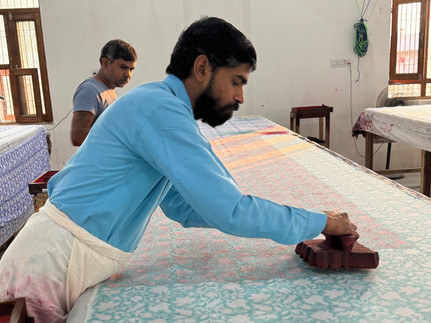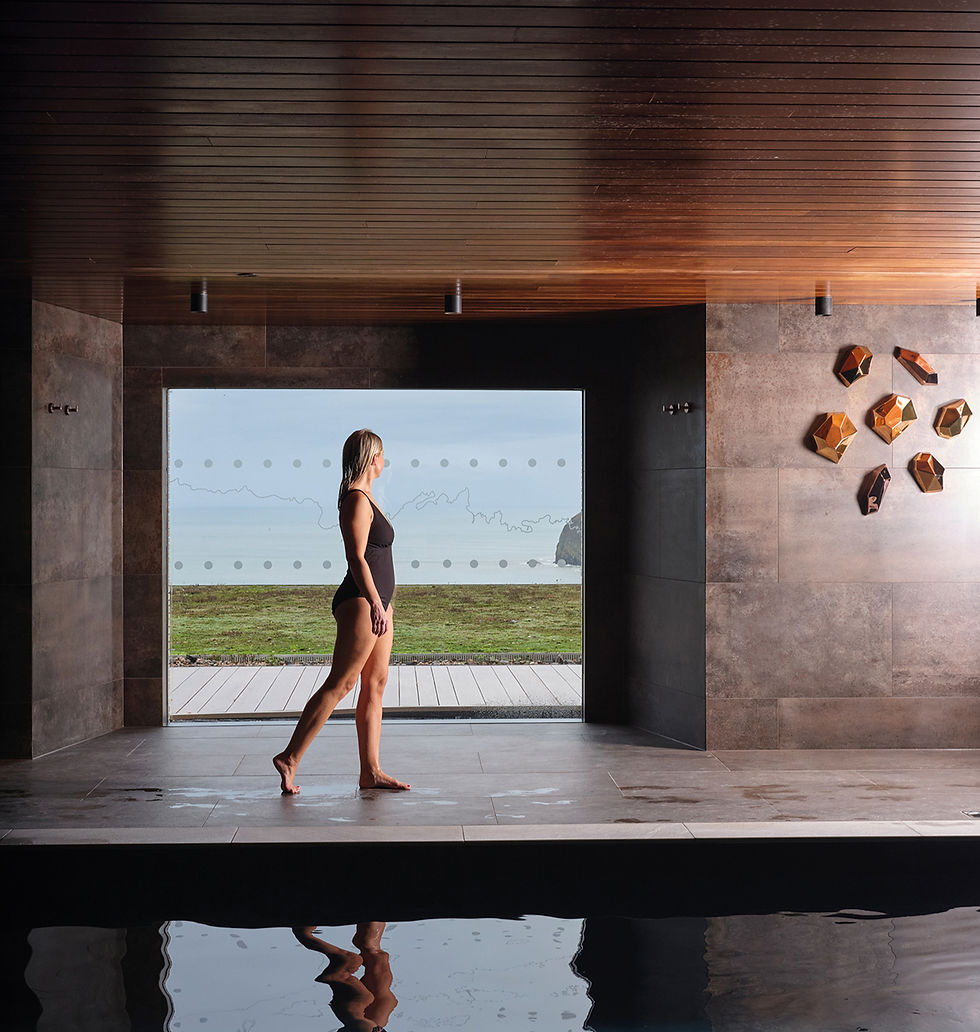Threads of purpose
- Hannah Tapping

- Nov 3, 2025
- 6 min read
Words by Hannah Tapping
Where elegant, timeless design meets artisan craftsmanship and environmental respect.

When Lucy Macnamara first stumbled upon a pair of beaded Kenyan sandals on holiday in South Africa, she had little inkling that they would spark the beginnings of a brand that now defines conscious fashion for women who care as much about where their clothes come from as how they look.
“I found a lodge one day selling Kenyan sandals and thought, aren’t these beautiful?” she recalls. “I tried them on and thought that they would be well received in the UK.” That simple spark set Lucy on a path that would blend style with purpose and ethics long before sustainability became a buzzword. At the time, she was working for a charity connected to the Prince’s Trust, a role that had shaped her values and her belief in doing business that creates positive impact beyond the product. “From working for the charity for 15 years, I always wanted to give back. It wasn’t solely about making profits. I wanted sustainability written into our DNA,” Lucy tells me.
That ethos remains at the heart of Aspiga, the ethical fashion brand Lucy founded in 2006, built initially on the craftsmanship of Kenyan artisans. It began, quite literally, from the boot of her car. “I started selling at different events and in the office,” she says with a smile. “At the end of the summer, I bought 200 of these sandals and by September I only had 20 pairs left!”

Within a year, she was exhibiting at Top Drawer in London and landing Aspiga products in 40 stores, including Fenwick on Bond Street. “I carried on working while my sister sent orders out from her house. It got to the point that my father said, I think this is going to kill you trying to do both jobs, I think your business has got legs. So I left the charity and worked full-time on Aspiga.”
From that point on, Aspiga grew with quiet determination and a clear sense of purpose. The company was self-funded and remains so: “I’ve done it all on my own, with one small step at a time,” Lucy says. The foundations were strong; what began with beaded sandals and belts evolved into full collections of beachwear, clothing and accessories that now fill Aspiga’s nine stores and a thriving online platform.
Aspiga clothing is instantly recognisable: colourful yet classic, relaxed yet refined and always made with fabrics that feel as good as they look. “The thing I love most about Aspiga is seeing three generations wearing it,” Lucy says. “One of our models was in Barbados with her mum and grandmother – all three were wearing Aspiga. That’s what I love: daughters, mothers, and grandmothers, all finding something that suits them.”
That intergenerational appeal is no accident. Lucy’s designs combine flattering silhouettes, thoughtful details and natural fabrics. “We might not be the cheapest beachwear, but our clothes last,” she explains. “All our suppliers in India know how important quality control is for us. The checks they go through for us, they don’t do for other companies.”
While summer remains Aspiga’s natural season — with airy cottons, embroidered dresses and hand-beaded details that evoke barefoot days by the sea — the brand’s winter collection has quietly established its own loyal following. “People are often surprised by our autumn–winter range,” Lucy admits. “But the stretch corduroy dresses and suits are really beautiful on most people. They’re comfortable, figure-flattering, and unique. Some customers only buy our winter clothes!”
In fact, it’s this collection that has caught the attention of the fashion press. “Anna Murphy and Lisa Armstrong both love our winter suits and dresses,” Lucy says with delight. “They’ve got stretch in the cord, which makes them so flattering. I wear them on repeat.”
Her personal wardrobe, she laughs, “is fully made up of Aspiga – for obvious reasons.” Her favourites include the brand’s classic Vienna white shirt and merino wool polo necks. “I’m a real fan of knitwear. Our merino and cashmere blends are beautiful and if looked after will last a lifetime.”
For Lucy, style and ethics have always been intertwined. Aspiga became one of the UK’s early B Corp certified fashion brands, formally recognising its commitment to social and environmental responsibility. Yet maintaining that certification hasn’t been easy in today’s retail climate. “It’s a tough environment out there,” she admits. “Three of my competitors have gone under in the last six months, but for me there’s no compromise. I have to stay true to my values, which I believe is at the heart of our success.” B Corp certification requires brands to continually improve their impact, something Lucy sees as both a challenge and a strength. “We couldn’t be recertified and come back with a lower score. So we came in seven points higher, which I’m delighted about. But it takes time and money – we had a full-time person working on it. It’s an added pressure, but it’s important.”

That integrity extends to every part of the supply chain. Aspiga’s partnerships in India and Kenya are grounded in respect for craftsmanship and community. “We’ve just been to India and the wonderful block print story there is magical,” Lucy says. “The artisans learn to carve the blocks and print by hand, skills passed down through generations. People don’t realise the work that goes into block prints – each colour has a new hand block carved, and each block takes a week. That’s six weeks just for one print before you even start printing.”
She pauses. “Even our staff can’t always tell if something’s block printed or not – people can replicate the look, but not the feel or spirit behind it. That’s why we need to tell our story more.” The same meticulous care is evident in the brand’s beaded accessories. “Our hand-beaded belts and dog collars can take a day to make,” she explains. “They’re not made in factories, these are people sitting there doing this work by hand, bead by bead. When you see them work, it’s incredible.”
Cornwall, too, has become part of Aspiga’s story. “It was during lockdown that everyone was flooding down to Cornwall,” Lucy remembers. “A friend told me about a shop in St Mawes, owned by the wonderful Hotel Tresanton, that was empty. We spoke to them, and they kindly leased it to us. We did so well that first day as everyone was holidaying there instead of abroad. A lot of our customers holiday in Cornwall, so it was an appropriate place. And I personally love it myself. When business is really tough, you’ve got to choose places you like going to,” she says, laughing.
For Lucy, the connection between Aspiga’s breezy, sun-drenched designs and the laid-back Cornish lifestyle is seamless. “The summer collections really align, embracing looking lovely but being comfortable.Something you can walk on the beach in.” In an age of fast fashion, Lucy’s belief in craftsmanship and longevity feels refreshing. Aspiga’s clothes are designed for longevity both in quality and in spirit. “When you buy something handmade, organic, and made with love, it means something,” Lucy says. “It’s not gone through a machine. It has an inner depth.”
The human connection between maker, wearer and planet is what makes Aspiga special. “The artisans are the bit I love most,” Lucy reflects. “Seeing the work they do, the care, the patience… that’s what our customers love too. Hopefully we can convey just a few of those stories when people buy them.” As Aspiga continues to grow, Lucy’s focus remains unchanged: to create beautiful, sustainable fashion that gives back to the world it draws inspiration from.
“We’ve always done it one step at a time,” she says. “There’s no investor money, no big corporate push, just belief in doing things the right way.” Perhaps that’s why Aspiga feels so authentic. It’s an independent brand that has stayed true to its roots, from Kenyan beads to Cornish shores. In Lucy’s words: “It’s about creating something timeless, pieces that last, that make you feel good, and that do good too.”
Aspiga has two Cornish stores, a pop-up at St Moritz Hotel, Trebetherick, PL27 6SD and Aspiga (previously Onda), St Mawes, TR2 5DQ, open Monday to Saturday 10am to 5pm.




















